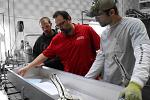Editor-in-Chief
- FMA
- The Fabricator
- FABTECH
- Canadian Metalworking
Categories
- Additive Manufacturing
- Aluminum Welding
- Arc Welding
- Assembly and Joining
- Automation and Robotics
- Bending and Forming
- Consumables
- Cutting and Weld Prep
- Electric Vehicles
- En Español
- Finishing
- Hydroforming
- Laser Cutting
- Laser Welding
- Machining
- Manufacturing Software
- Materials Handling
- Metals/Materials
- Oxyfuel Cutting
- Plasma Cutting
- Power Tools
- Punching and Other Holemaking
- Roll Forming
- Safety
- Sawing
- Shearing
- Shop Management
- Testing and Measuring
- Tube and Pipe Fabrication
- Tube and Pipe Production
- Waterjet Cutting
Industry Directory
Webcasts
Podcasts
FAB 40
Advertise
Subscribe
Account Login
Search
A call for the metal fabricating industry to shape up
- By Dan Davis
- August 14, 2015
With Internet, you don’t have to spend too much time wondering what happened to former colleagues or friends. The answer often can be found with a few keywords and a search engine.
I did just that as I was thinking about some potential interview candidates for an upcoming story on the different career paths that fabricators can follow. I had met this young welder about five years ago, and I was wondering just what he was up to.
Well, it wasn’t welding. He’s in the U.S. Marine Corps after finally giving up on trying to start a meaningful welding career. Truthfully, the timing of his job hunt couldn’t have been worse. He was trying to find a manufacturing job coming on the heels of the Great Recession.
His words—found on a social media forum—are pretty shocking. He complains of being the only welder who hadn’t been incarcerated at one job and then being told that his AWS certification was not good enough to substitute for real-world experience. Being among “derelicts and losers” in his job search didn’t do much for his believing that he was on a strong career path.
Fortunately, it seems that this young man has found a home in the U.S. armed forces. He has the intelligence and drive to make a positive impact in the Marines.
Unfortunately, his experience in trying to establish a career in metal fabricating is not an isolated case. As companies complain about the lack of skilled workers available to step right in and start contributing on the shop floor, many of them aren’t doing much to create an environment that is professional and welcoming. Too many metal fabricators just want someone to put their head in the arc and stay at it for the majority of the eight-hour shift. They aren’t thinking career path. They aren’t thinking skills development. They are thinking that the shop floor workers are a human resource to be used up and tossed aside when done.
It’s an ugly truth. Shops that complain about the welder who can’t pass a drug test or the machine operator who can’t show up on time also probably don’t do much to attract workers that don’t have drug or absentee issues. What they project is often what they attract.
Also, please don’t blame the millennials. They’ll make fine workers—for the right companies.
This is a case of metal fabricators needing to operate like real businesses, not just some sideline hobby. Attracting and retaining metal fabricating talent is a key to growing a business. Shop owners and managers need to create an environment where people can contribute and develop skills that can help the employer and benefit the employee.
Sure, an employee can leave, but if the work environment is rewarding, that same employee might come back when he finds that he can’t find something that replicated what he left.
Even if they do depart and don’t come back, good companies doing the right thing have a much easier ability to attract good job candidates—leaving the derelicts and losers to apply elsewhere. (Hopefully, that’s not in the metal fabricating industry.)
subscribe now

The Fabricator is North America's leading magazine for the metal forming and fabricating industry. The magazine delivers the news, technical articles, and case histories that enable fabricators to do their jobs more efficiently. The Fabricator has served the industry since 1970.
start your free subscriptionAbout the Author

Dan Davis
2135 Point Blvd.
Elgin, IL 60123
815-227-8281
Dan Davis is editor-in-chief of The Fabricator, the industry's most widely circulated metal fabricating magazine, and its sister publications, The Tube & Pipe Journal and The Welder. He has been with the publications since April 2002.
- Stay connected from anywhere

Easily access valuable industry resources now with full access to the digital edition of The Fabricator.

Easily access valuable industry resources now with full access to the digital edition of The Welder.

Easily access valuable industry resources now with full access to the digital edition of The Tube and Pipe Journal.
- Podcasting
- Podcast:
- The Fabricator Podcast
- Published:
- 04/16/2024
- Running Time:
- 63:29
In this episode of The Fabricator Podcast, Caleb Chamberlain, co-founder and CEO of OSH Cut, discusses his company’s...
- Industry Events
16th Annual Safety Conference
- April 30 - May 1, 2024
- Elgin,
Pipe and Tube Conference
- May 21 - 22, 2024
- Omaha, NE
World-Class Roll Forming Workshop
- June 5 - 6, 2024
- Louisville, KY
Advanced Laser Application Workshop
- June 25 - 27, 2024
- Novi, MI































